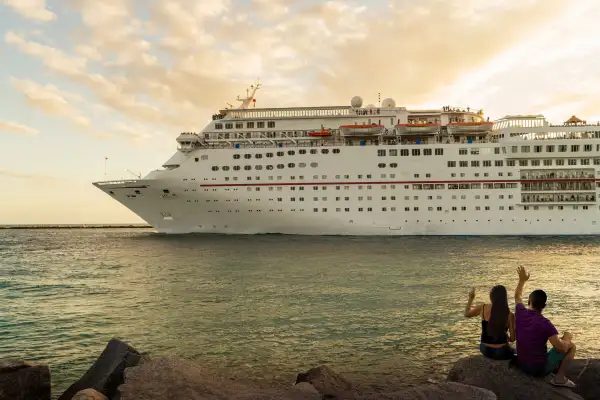Best Cruise Travel Insurance

Whether you’re taking a cruise domestically or internationally, one way of giving yourself peace of mind while out on the open water is by having the best cruise travel insurance. Such a policy can help pay for unexpected events, from trip cancellations to emergency medical expenses and everything in between.
To help you choose a suitable plan, here's a lowdown on the cruise travel insurance companies, complete with the packages they offer.
Our Top Picks for Best Cruise Travel Insurance
- Berkshire Hathaway — Best for Cruise-Specific Coverage
- AXA Assistance USA — Best for Affordable Premiums
- TravelSafe Insurance — Best for Senior Passengers
- AIG Travel Guard — Best for Preexisting Conditions
- Seven Corners Travel Insurance — Best for High Coverage Limits
Best Cruise Travel Insurance Reviews
| Company | Policy | Trip Duration | Cost of Coverage* |
| Berkshire Hathaway | WaveCare | Seven days | $548 |
| LuxuryCare | Seven days | $587 |
*This sample is based on a 45-year-old traveling to Portugal on a $10,000 trip. Exact costs will depend on your age, destination, trip duration, the policy of choice and preexisting medical conditions, among other factors.
- Cruise delay coverage
- Option to choose LuxuryCare for increased coverage
- Coverage for cruise ship disablement is only $500
- No emergency dental coverage
Why we chose it: While Berkshire Hathaway has a wide range of travel insurance plans, its WaveCare Travel Protection is specifically for cruisers. It comes with up to 150% reimbursement coverage for trip interruption and $750,000 for emergency evacuation.
WaveCare Travel Protection is Berkshire Hathaway’s comprehensive travel insurance for a cruise. For covered reasons, the policy offers:
- Reimbursement up to 150% of the trip cost for trip interruption
- Reimbursement of 100% for trip cancellation
- $750,000 for emergency evacuation
- $75,000 for medical expenses
- $1,500 for lost or stolen baggage, personal items and documents
- $200 for baggage delay
- $500 if your cruise ship is disabled
- $1,000 if your cruise is delayed for five hours or more
Berkshire Hathaway offers add-on options to boost your basic coverage, such asa cancel-for-any-reason (CFAR) add-on that compensates you if you cancel your cruise trip for any reason other than those listed on your policy. Some common reasons include if you or your travel companion:
- Fall ill
- Sustain injuries from a road accident
- Have a death in the family
- Receive a jury summons
Other add-ons that Berkshire Hathaway includes are a preexisting medical condition exclusion waiver, accidental death or dismemberment and car rental collision coverage. The latter may be necessary if you intend to use a rental car to and from the port.
If you’re planning a high-value cruise trip and would like more coverage, Berkshire Hathaway also offers LuxuryCare, a more expensive policy for luxury travelers. It’s not cruise-specific, but it provides similar coverage to WaveCare with the added benefit of concierge service and $100,000 in medical insurance coverage. You also get $1 million in coverage for medical evacuation.
Both policies come with 24/7 assistance and the ability to file claims using Berkshire Hathaway’s website or mobile app. It has an AM Best rating of A++, meaning that it has a superior ability to meet its claims and financial obligations.
| Company | Policy | Trip Duration | Cost of Coverage* |
| AXA Assistance USA | Silver | Seven days | $283 |
| Gold | Seven days | $375 | |
| Platinum | Seven days | $447 |
*This sample is based on a 45-year-old traveling to Portugal on a $10,000 trip. Exact cost will depend on your age, destination, trip duration, the policy of choice and preexisting medical conditions, among other factors.
- Three plans to choose from
- All plans include concierge services
- Generous coverage for lost and delayed baggage
- Silver plan not eligible for any add-ons
Why we chose it: AXA Assistance’s Silver Plan is the most affordable policy on this list — based on the sample traveler — yet its coverage is competitive.
AXA Assistance USA offers three travel insurance plans, each with its own level of protection, with the Silver Plan being the most affordable of the options. Based on the sample above, the Silver Plan costs 2.83% of the total trip expenditures, which is much lower than the industry standard (usually between 4 to 10%). Keep in mind that your exact premium may be higher depending on your age and trip cost, among other factors. Nonetheless, you can expect your cruise insurance cost to be within the market average, if not lower.
The Silver plan provides:
- 100% reimbursement of trip cost for trip interruption
- 100% reimbursement of trip cost for trip cancellation
- $100,000 for emergency medical evacuation
- $25,000 for medical expenses
- $750 for lost baggage or personal effects
- $200 for delayed baggage
The other two plans — Gold and Platinum — cost more but offer more protection. They both include 150% coverage for trip interruption, 100% for trip cancellation and a preexisting conditions exclusion waiver.
The Platinum plan is superior in all other aspects, offering $1 million for emergency medical evacuation, $250,000 for medical expenses, $3,000 for lost or stolen baggage and $600 for baggage delay. The Gold plan comes with $500,000 for emergency medical evacuation, $100,000 for medical expenses, $1,500 for lost or stolen baggage and $300 for delayed baggage.
AXA Assistance currently has two add-ons. The first is CFAR, which provides reimbursement for 75% of the trip cost but is only available with the Platinum plan. The second add-on is collision damage waiver for rental cars, which is available with both the Platinum and Gold plans.
All plans include 24/7 concierge services and worldwide assistance. The company has an A+ AM Best rating, which means that it has a superior ability to pay for claims and meet its financial obligations.
| Company | Policy | Trip Duration | Cost of Coverage* |
| TravelSafe | Basic | Seven days | $479 |
| Classic | Seven days | $638 |
*This sample is based on a 45-year-old traveling to Portugal on a $10,000 trip. Exact costs will depend on your age, destination, trip duration, policy of choice and preexisting medical conditions, among other factors.
- Accident and sickness cover suitable for seniors
- 21-day period for adding CFAR is more than the industry standard
- Classic plan includes itinerary change coverage
- Comes with cruise-specific protection like missed connection
- Trip delay coverage takes six hours to kick in
- CFAR add-on is not available with the Basic plan
Why we chose it: TravelSafe Insurance includes emergency accident, sickness and medical expense coverage in both of its plans, making them ideal for an older traveler who may need medical reassurance while on a cruise.
TravelSafe Insurance offers two coverage packages: the Basic Plan and the Classic Plan. The Classic plan includes:
- 100% for trip cancellation (up to $100,000)
- 150% for trip interruption
- $2,500 for a missed trip connection
- $150 per day (up to $2,000) for trip delay
- $100,000 for accident and sickness medical expenses
- $1 million for emergency medical evacuation
- $25,000 for nonmedical evacuation
- $25,000 for death and dismemberment
- $2,500 for lost or stolen baggage
- $250 for baggage delays
The Basic package is less expensive because it comes with less protection. Under this plan, TravelSafe offers:
- 100% for trip cancellation (up to $10,000)
- 100% for trip interruption
- $500 for a missed trip connection
- $100 per day (up to $1,000) for trip delay
- $35,000 for accident and sickness medical expenses
- $100,000 for emergency medical evacuation
- $500 for lost baggage
- $100 for baggage delay
The Basic plan doesn’t include nonmedical evacuation, death and dismemberment coverage or coverage for itinerary changes.
TravelSafe provides optional add-ons, such as an extended personal protection package, additional death and dismemberment coverage and rental car damage. If you buy the Classic plan, you may also add CFAR, which gives you up to 75% protection if you cancel your cruise trip for any reason. This will only be valid if you buy the CFAR add-on within 21 days of making the first deposit for your trip.
TravelSafe offers 24/7 emergency assistance on both of its plans. It has an AM Best rating of A, which means that the company has an excellent ability to pay its claims and meet its financial obligations.
| Company | Policy | Trip Duration | Cost of Coverage* |
| AIG Travel Guard | Essential | Seven days | $321.18 |
| Preferred | Seven days | $445.10 | |
| Deluxe | Seven days | $538.59 |
*This sample is based on a 45-year-old traveling to Portugal on a $10,000 trip. Exact costs will depend on your age, destination, trip duration, policy of choice and preexisting medical conditions, among other factors.
- All plans are eligible for a preexisting conditions waiver
- Multiple add-ons available for policy customization
- All plans provide comprehensive coverage
- You must buy the Preferred or Deluxe plan to get CFAR add-on
- Lower-tier plans have low coverage amounts
Why we chose it: All three AIG Travel Guard plans come with an option for preexisting condition waiver, so you can choose a budget plan but still be covered for an identified preexisting condition.
Travel Guard by AIG has three plan options: Essential, Preferred and Deluxe. The Deluxe Plan is the costliest but offers the most coverage, including:
- 150% coverage for trip interruption
- 100% coverage for trip cancellation
- $1 million for emergency medical evacuation
- $100,000 for medical expenses
- $2,500 for lost or stolen baggage
- $500 for baggage delay
The Preferred plan includes:
- 150% coverage for trip interruption
- 100% coverage for trip cancellation
- $500,000 for emergency medical evacuation
- $50,000 for medical expenses
- $1,000 for lost or stolen baggage
- $300 for baggage delay.
The Travel Guard Essential plan, which is meant for the budget traveler, is the most affordable and includes:
- 100% coverage for trip interruption
- 100% coverage for trip cancellation
- $150,000 for emergency medical evacuation
- $15,000 for medical expenses
- $750 for lost or stolen baggage
- $200 for baggage delay
The Travel Guard Essential plan doesn’t include travel inconvenience protection or CFAR, both of which the Preferred and Deluxe plans provide.
Travel Guard has other add-ons that are only available with the Preferred and Deluxe plans such as coverage for lodging expenses, trip exchange, security evacuation and trip saver.
Regardless of your policy, AIG Travel Guard provides 24/7 customer assistance. The company has an AM Best rating of A, which means that it has an excellent ability to pay out claims and meet its financial obligations.
| Company | Policy | Trip Duration | Cost of Coverage* |
| Seven Corners Insurance | RoundTrip Basic | Seven days | $541 |
| RoundTrip Choice | Seven days | $707 |
*This sample is based on a 45-year-old traveling to Portugal on a $10,000 trip. Exact costs will depend on your age, destination, trip duration, policy of choice and preexisting medical conditions, among other factors.
- Highest coverage for cruise travel
- You may get coverage for event tickets
- Basic and Choice plans are more expensive than other companies
Why we chose it: Seven Corners’ Choice Plan offers a high coverage limit of $1 million for emergency evacuation and $500,000 for medical protection. Combined, these amounts exceed the coverage you’ll get from any other company we reviewed.
Seven Corners Insurance has two tiers of travel insurance for cruise trips: the RoundTrip Basic and the RoundTrip Choice. The latter has the highest coverage limit, topping out at $1 million for emergency evacuation and $500,000 primary coverage for emergency medical and sickness expenses. You also get up to 150% compensation for trip interruption, 100% for trip cancellation, $2,500 for lost baggage and $100 for baggage delay.
RoundTrip Basic comes with:
- 100% for trip cancellation
- 100% for trip interruption
- $100,000 secondary medical coverage
- $250,000 emergency medical evacuation
- $500 for lost or stolen baggage
- $100 for delayed baggage
Both of these plans include up to 75% optional CFAR coverage, 75% optional trip interruption-for-any-reason (IFAR) coverage, missed tour or cruise connection compensation and emergency dental protection.
The main difference between the two plans is that RoundTrip Basic doesn’t have certain benefits like the preexisting medical conditions waiver and death and dismemberment coverage. RoundTrip Choice has both as well as other unique advantages that are not available in other policies, including frequent traveler rewards, a pet kennel and event ticket coverage.
With both plans you get 24/7 travel assistance. The company is rated A from AM Best, which means that it has an excellent ability to pay out claims and meet its financial obligations.
Other cruise travel insurance we considered
Nationwide
- Up to 150% compensation for trip interruption
- Covers itinerary changes
- Basic plans have low coverage limits
- CFAR is only available on the Luxury plan
Nationwide has three cruise travel insurance plans: the Universal Cruise plan, Choice Cruise plan and Luxury Cruise plan. The latter is geared toward travelers who prefer luxurious travel, the Choice Cruise is Nationwide’s mid-level policy that’s meant to provide just enough coverage at average market rates, and the Universal Cruise plan makes sense if you’re working with a shoestring budget.
Nationwide didn’t make the cut because CFAR is only available if you choose the Luxury plan, meaning that you will need to purchase the most expensive plan to include this add-on to your travel insurance for a cruise. Also, the medical coverage you get is secondary to your existing health insurance policy, and dental coverage is limited to $750 for all three plans.
World Nomads Travel Insurance
- Covers over 200 cruise-oriented activities
- You can extend your insurance coverage mid-trip
- Coverage period of up to 180 days
- Seniors must choose Silver Nomads policy
- Cancellation and interruption protections are capped at specific dollar amounts instead of a percentage of the total trip cost
World Nomads offers cruise insurance policies geared toward adventurous travelers. It provides coverage for over 200 activities, including skydiving, scuba diving and bungee jumping. The company allows you to buy coverage for up to 180 days, and you can extend your policy mid-trip.
World Nomads Travel Insurance didn’t make the cut because the company pushes its Explorer policy more than the Standard policy, which makes it more suitable for adventure travel rather than general cruising. World Nomads caps trip cancellation and interruption protection at dollar amounts — $10,000 and $2,500 for Explorer and Standard policies, respectively — rather than as a percentage of your total trip cost, which is the industry standard. Also, if you are a senior traveler of 70 years or more, you must include the Silver Nomads add-on to your policy, which may push your cost of cruise insurance upward unnecessarily.
John Hancock Travel Insurance
- Travel delay compensation kicks in after only three hours of delay
- High baggage protection of up to $2,500
- Hurricane and weather protection available
- Costlier than most other cruise insurance policies
- Baggage delay compensation kicks in after a 12-hour wait
- Low tier plans provide minimal coverage
John Hancock has three different travel insurance plans: the Silver, Bronze and Gold plans. Silver is the most basic plan, Bronze is mid-level for the traveler with an average budget while Gold is for the luxury cruiser. The Gold plan covers preexisting medical conditions if you buy the policy within 14 days of making a deposit for your trip, but the other two don’t have this option.
John Hancock didn’t make the cut because of its high premiums, especially if you choose its Gold plan. For the same type of coverage, you can get a cheaper policy from another company if you compare different cruise insurance options.
Cruise Travel Insurance Guide
What is cruise travel insurance?
Cruise travel insurance is a type of insurance that protects you while you are on a cruise. It typically covers unexpected events such as trip cancellations or interruptions, medical emergencies, lost or delayed luggage and ship disablement.
Although some of the best travel insurance companies may offer general travel plans that cover cruises, some companies also sell specific policies for these kinds of trips.
How does cruise travel insurance work?
As with most types of insurance, policyholders pay a premium to the insurance company in exchange for coverage. Policyholders can file a claim to receive compensation for related expenses if an unexpected event occurs.
Cruise travel insurance policies can reimburse you for the cost of canceling a cruise trip. Some common cancellation reasons that you will find in a typical policy include:
- The death of a family member, business partner or travel companion
- If you, your family member, business partner or travel companion falls ill
- If you or your travel companion are forced to quarantine or are summoned for jury duty
- If you or your travel companion's home is rendered uninhabitable by a natural disaster, fire or another event beyond your control
- If you or your travel companion are involved in a road accident just before you start the cruise
- If an unannounced strike causes the cruise company you booked to halt operations
Cruise travel insurance policies often cover trip interruptions as well. For example, the policy may cover your expenses if the ship breaks down and you have to fly home mid-voyage.
Beyond cancellation and interruption, many policies often cover the medical expenses you may incur while on the ship. These may include the cost of treatment and, if necessary, evacuation to a medical facility or back home.
Types of cruise travel insurance coverages
Emergency medical evacuation coverage
This coverage helps you pay for evacuation expenses if you have a medical emergency while on a cruise ship if the ship’s medical providers can’t treat you. The coverage will reimburse for the cost of transportation to the nearest medical facility or your home.
Trip interruption coverage
This coverage reimburses your prepaid, unused, nonrefundable expenses in case you must cut your cruise trip short due to an unexpected event, such as illness, death, injury or a family emergency back home.
The coverage typically includes a last-minute return ticket home or to your desired destination. Keep in mind that the policy must state the reason for an interruption for this coverage to be valid. In most cases, your typical cruise travel insurance won't cover things like parasailing excursions, scuba diving, cancellations due to foreseeable events, such as CDC and NOAA warnings or the death or illness of a pet.
Trip cancellation coverage
Trip cancellation coverage reimburses the prepaid and nonrefundable deposits that you would lose in case you must cancel your cruise trip for a reason covered by the policy. These reasons range from death and illness to jury duty summons and family emergencies.
Cancel for any reason coverage
Typically offered as an add-on, CFAR coverage reimburses a percentage of your trip cost — usually 75% — for any reason, including those not listed on your policy. Many insurance companies often have a time window where you can cancel a trip for any reason. For example, your policy may allow you to cancel at least 48 hours before your set departure date.
Coverage for preexisting medical conditions
Coverage for preexisting medical conditions in cruise travel insurance refers to the extent that an insurance policy covers medical expenses related to a medical condition that the insured had prior to purchasing the policy. To qualify for the coverage, travelers must meet certain requirements such as purchasing the policy within a limited period after paying your first deposit for the trip and purchasing travel insurance for 100% of the trip cost, among others.
Coverage can vary depending on the specific policy and insurer, with some policies excluding coverage entirely for specific conditions or offering limited coverage or waiting periods. It is important to disclose preexisting conditions when purchasing the policy and carefully review the policy's coverage for such conditions and the aforementioned exclusions or waiting periods.
How much is travel insurance for a cruise?
The cost of cruise insurance varies depending on several factors, including your age, destination, length of cruise, trip cost and the time left before your departure date. Different insurance providers will also have their own underwriting criteria, which leads to varying prices for a single trip.
That said, cruise insurance will typically cost anywhere between 4% and 12% of the total trip cost. Using these percentages, for a $10,000 trip, you should consider budgeting between $400 and $1,200 for travel insurance costs.
How to choose the best cruise travel insurance
Determine if your trip needs to be insured
Travel insurance is mandatory in some countries and optional in others. Countries that require you to have travel insurance include: Algeria, Antarctica, Argentina, Aruba, Cuba, Ecuador, Fiji, Georgia, Lebanon, Iran, Israel, Jamaica, Jordan, Moldova, Morocco, Nepal, Qatar, Romania, Rwanda, Schengen countries, Seychelles, Singapore, Togo, Turkey and the UAE. That said, even if you’re not legally required to have it, travel insurance may still be beneficial for your protection and peace of mind.
Compare policies
Compare travel insurance policies from various providers to see which one fits your needs and budget. Several cruise insurance comparison travel booking sites may help, including SquareMouth, Insubuy and Aardy.
Get multiple quotes
After you compare travel insurance companies, narrow down your options to policies that provide the amount of coverage you’re looking for. Get online quotes from the company websites and compare the different packages they offer. Make sure to always read the fine print. because that’s where you’ll discover what a policy does and doesn’t cover.
Cruise Travel Insurance FAQ
Does travel insurance cover COVID-19?
What does cruise travel insurance cover?
When to buy travel insurance for a cruise
How We Chose the Best Cruise Travel Insurance
We selected the best cruise travel insurance companies based on these criteria:
- The policy options available for cruisers
- The cost of premiums for coverage
- The coverage types the company offers
- Whether the company offered preexisting conditions add-ons
- The percentage of reimbursement for trip cancellation and interruption
- AM Best ratings of the companies
Summary of Money’s Best Cruise Travel Insurance
- Berkshire Hathaway — Best for Cruise-Specific Coverage
- AXA Assistance USA — Best for Affordable Premiums
- TravelSafe Insurance — Best for Senior Passengers
- AIG Travel Guard — Best for Preexisting Conditions
- Seven Corners Travel Insurance — Best for High Coverage Limits












